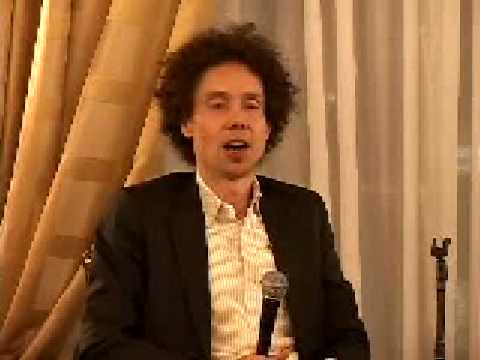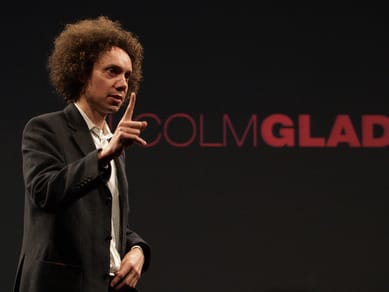Everybody loves Malcolm
 I used to dread going to parties. I stood around struggling with small talk, waiting for an opening to debate about big ideas. That changed 13 years ago, the day I read The Tipping Point.
I used to dread going to parties. I stood around struggling with small talk, waiting for an opening to debate about big ideas. That changed 13 years ago, the day I read The Tipping Point.
Suddenly, everyone wanted to talk about Malcolm Gladwell's ideas, and I felt right at home. He made social science cool in watercooler chatter, spawning an entire genre of books that blend stories and studies to explain how the world works. He carried me through a decade of dinner parties with and . With last week's release of David and Goliath, I'll be set for a while.
Gladwell refers to his books as "conversation starters," and when people pick up that conversation, they often start criticizing his work. As a social scientist, I think this is a missed opportunity. I'm not saying that Gladwell's writing is perfect or that his arguments are always true. I just want to make sure that we don't throw out the baby with the bathwater, since we can learn as much from analyzing what he does right as from poking holes in his work. At a recent event, the discussion shifted away from the substance of Gladwell's arguments, and toward the style: why is he arguably the most spellbinding nonfiction writer of our time?
The most popular explanation was storytelling skills: he's a master of suspense, to the point that his books read like mystery novels. Some people waxed poetic about how he brings characters to life-who could forget the Six Degrees of Lois Weisberg or the tragic genius of Chris Langan? Others highlighted his ability to present sticky concepts that quickly make their way into the lexicon, like thin slicing, the 10,000 hour rule of expertise, and the magic number of 150 for social groups. And of course, his ability to illustrate social science with examples from popular culture loomed large in the discussion. Who wouldn't want to read about how Hush Puppies took off, why Phantom of the Opera and Sesame Street hit it big, and what led Bill Gates and the Beatles to greatness? (There's even a Malcolm Gladwell Book Generator website that plays on this notion by proposing new titles like Clarissa: How One Woman Explained It All; The Cheers Effect: How and Why Everybody Knows Your Name; and Lando: Intergalactic Lessons in Smoothness. )
If you believe that Gladwell's success is primarily driven by his writing, I think you've overlooked the most important factor. What makes him most interesting is not the narratives themselves, but rather the ideas behind them.
In 1971, a sociologist named Murray Davis published a groundbreaking paper that opened with these two lines:
It has long been thought that a theorist is considered great because his theories are true, but this is false. A theorist is considered great, not because his theories are true, but because they are interesting."
Davis argued that the difference between the dull and the interesting lies in the element of surprise. When an idea affirms what we already believe, we're bored-we call it obvious. But when an idea is counterintuitive, we're intrigued. Our curiosity is piqued, and we're motivated to ask questions: how could this be? Is it really true? What else might this explain?
Challenging our assumptions is what Malcolm Gladwell does best. To see how he does it, let's take a look at what Davis called The Index of the Interesting. Davis classified 12 different ways of challenging conventional wisdom, and Gladwell's key ideas map beautifully onto at least five of them.
1. Bad is Good and Good is BadThe idea here is to take a negative and unveil its positive side, or vice-versa. This is the theme of David and Goliath, where Gladwell argues that disadvantages can give us advantages. Who would have thought that a disability like dyslexia could actually make people more successful? With reasoning reminiscent of the Daredevil comic books, he illustrates how the absence of one ability-reading-can lead people to develop other abilities in areas like creative problem solving, acting, listening, and rule-bending. He presents data suggesting that losing a parent as a child, one of the worst things that can happen in life, may actually increase your odds of becoming president or prime minister. He also explores the other side of the coin, arguing that power led the British Army and Southern segregationists to underestimate uprisings in Northern Ireland and Alabama.
2. What Looks Like an Individual Phenomenon is Really a Collective PhenomenonAnother way to challenge assumptions is to show that what we think is caused by individuals is in fact caused by broader societal forces. This is the heart of Outliers. Gladwell argues that we think professional hockey and soccer players make it because of talent and hard work, but it's really about being born a few months earlier than their peers. We assume that planes crash due to mistakes made by individual pilots, but it's actually about the cultures in which they were raised. We believe Bill Gates and the Beatles achieved greatness because of their talents, but they had to be in the right place at the right time.
Gladwell does the opposite in The Tipping Point, arguing that major collective changes are actually fueled by small numbers of people. Styles and social movements catch on when connectors build bridges between people and ideas, mavens share expertise, and salesmen convince people to come aboard.
3. What Seems to Succeed Fails, and What Seems to Fail SucceedsIt's interesting when something that appears to work doesn't, or when something that looks ineffective proves to be effective. In David and Goliath, Gladwell covers evidence that contrary to popular belief, small classes in schools don't lead children to learn more. In Blink, he adopts the reverse strategy, showing that although we expect reason to outdo intuition, we underestimate the power of intuition. We believe that the best way to spot fake art is through systematic analysis, but an expert can tell in the blink of an eye. Even when critical information is stripped away, and we only have tiny clues, our intuition can be strikingly accurate. A 10-second silent video clip is enough to spot an engaging teacher; an audiotape with the words garbled so that we can only hear the tone still allows us to identify the surgeon who was sued for malpractice; and a 15-minute conversation about taking out the garbage allows us to predict which marriages will fail.
4. What Appears To Be Local is GlobalIt's also surprising when seemingly isolated events are in fact driven by common forces. This is another hallmark of The Tipping Point, which shows how the same kinds of dynamics can explain the spread of sexually transmitted diseases, pop culture trends, and crime sprees. We also see it in David and Goliath, where the willingness of underdogs to play by a different set of rules serves as a lens for illuminating events as diverse as the success of the American civil rights movement and an inferior basketball team with an inexperienced coach making the national championship. (The Gladwell Book Generator picks up on this theme too, with the faux title Nothing: What Sandcastles Can Teach Us About North Korean Economic Policy.)
5. What Looks Like Disorder is Actually OrderThe ability to find structure in chaos is another quality of interesting theories, and this is a signature strength of The Tipping Point. We think fads come out of nowhere, but if we appreciate Gladwell's three rules of epidemics-the law of the few, the stickiness factor, and the power of context-we can better understand the systematic factors that cause them to spread. Confusion turns into clarity in Outliers, where the puzzle of why a man with genius IQ works as a bouncer is traced to his difficult upbringing, and in David and Goliath, where the mystery of the greatest medical breakthroughs in modern history is also informed by a difficult upbringing.
On Becoming InterestingOf course, execution is important. Before presenting an idea, Davis observed that the author "articulates the taken-for-granted assumptions" of the audience, and only then reveals how the idea challenges these assumptions. This rhetorical strategy is visible in each Gladwell book: articulate what we currently think, and then present examples and evidence to show how our beliefs are incomplete, inadequate, inconsistent, or just plain wrong.
Interesting ideas are counterintuitive, but not all counterintuitive ideas are interesting. Davis warned that if we believe too strongly in an idea, we don't want to see it questioned:
one must be careful not to go too far. There is a fine but definite line between asserting the surprising and asserting the shocking, between the interesting and the absurd... those who attempt to deny the strongly held assumptions of their audience will have their very sanity called into question. They will be accused of being lunatics; if scientists, they will be called 'crackpots'. If the difference between the inspired and the insane is only in the degree of tenacity of the particular audience assumptions they choose to attack, it is perhaps for this reason that genius has always been considered close to madness."
Gladwell is very careful on this front. In David and Goliath, he intentionally avoided analyzing the Israel-Palestine conflict, knowing that it was a hot-button issue, and instead chose other conflicts that were more likely to intrigue than offend. At the same time, recognizing that his ideas need to have meaningful consequences, he addresses topics that matter to society. Gladwell writes about improving education and fighting crime, making planes safer and curing cancer, electing the right president and championing human rights. He also writes about ideas that matter to us as individuals. As Davis put it:
an audience will find a theory to be interesting only when it denies the significance of some part of their present 'on-going practical activity'... and insists that they should be engaged in some new on-going practical activity instead. If this practical consequence of a theory is not immediately apparent to its audience, they will respond to it by rejecting its value until someone can concretely demonstrate its utility: 'So what?' 'Who cares?' 'Why bother?' 'What good is it?'"
Gladwell's books make us care. He challenges us to rethink how we raise our children, how we build our workplaces, and how we live our lives. He gives us hope that if we practice enough, we can become great musicians or athletes. That if an idea is worthwhile, we can make it take off. That if we change the way we evaluate people, we can overcome stereotypes and give disadvantaged people an equal chance. That if we face disadvantages of our own, we can draw strength from them.
The Dangers of InterestingnessAlthough it's tempting to use the Index of the Interesting as a guide for developing an idea, Davis advised us not to do that. It works better as a mirror than a map. When we try to generate ideas in this formulaic fashion, it comes at the expense of creativity. Rather, the Index comes in handy once we have an idea: we can use it to explore different assumptions that we might be challenging. But this too proves difficult, Davis observed, because "assumptions about a topic" are often "too diverse or too amorphous" for any idea to be "universally interesting." Perhaps Gladwell's true genius lies here, in identifying common assumptions that lie just beneath the surface-beliefs that are so widely accepted, so taken for granted, that we don't even know we believe in them.
The punch line from Davis is that interestingness is in the eye of the beholder. What's fascinating to one audience is obvious to another. Over time, assumptions evolve, and reactions depend on the current assumptions of your audience. This means that if you successfully champion an interesting idea, it will eventually cease to be interesting, because everyone will believe it. And that's why we need Malcolm Gladwell to keep writing new books.
Adam is a Wharton professor, an organizational psychologist, and the author of Give and Take: A Revolutionary Approach to Success, a New York Times and Wall Street Journal bestseller. Follow him here by clicking the yellow FOLLOW above and on Twitter @AdamMGrant





